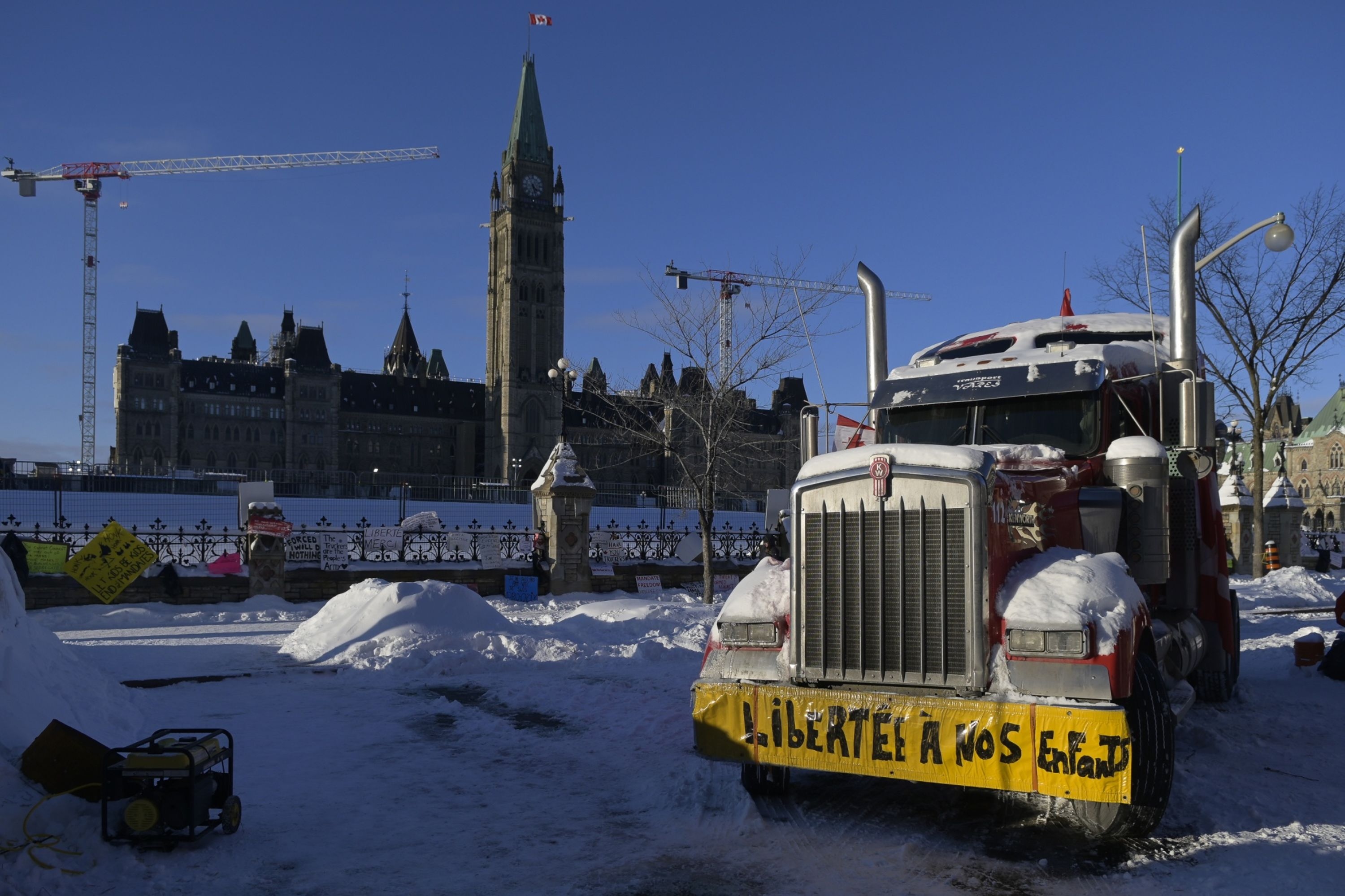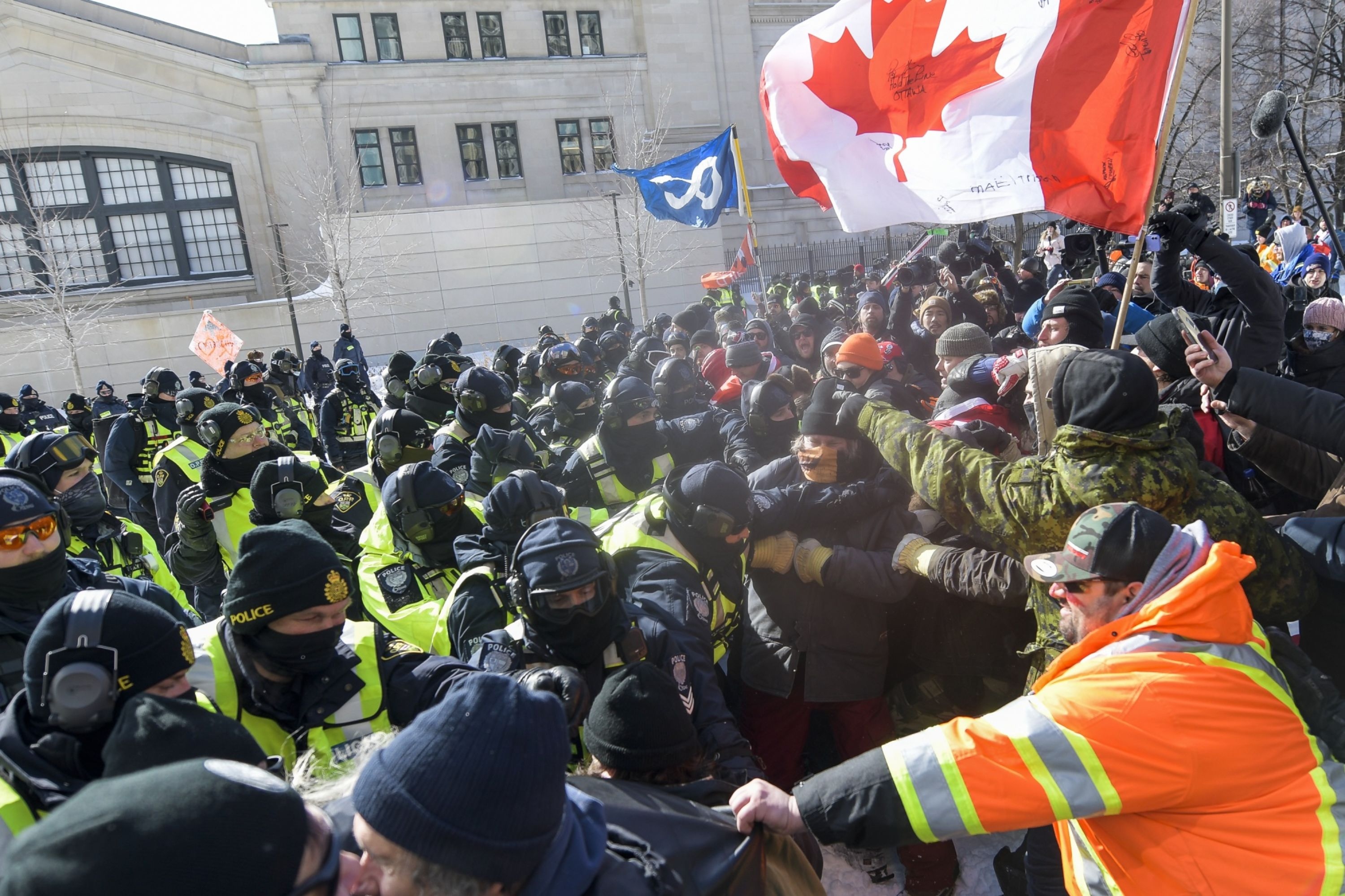Feb 22, 2022
Banks freeze millions in convoy funds under Trudeau edict
, Bloomberg News
Crackdown on blockade financing
Canadian banks froze about $7.8 million (US$6.1 million) in just over 200 accounts under emergency powers meant to end protests in Ottawa and at key border crossings, a government official said Tuesday.
The new tally was revealed in testimony to lawmakers examining Prime Minister Justin Trudeau’s decision to invoke the country’s Emergencies Act to end a three-week occupation of the nation’s capital.
Trudeau and his ministers have said the measures announced last week are meant to cut off funding to protest leaders and to pressure trucking companies to prevent their semis from being used again in blockades. Ottawa’s downtown core was cleared out over the weekend, but dozens of trucks remain gathered at encampments outside the city.

Isabelle Jacques, an assistant deputy minister at the finance department, said it’s “possible although very unlikely” that small donors to the convoy have seen their accounts frozen, given that law enforcement agencies have focused on those directly responsible for the protests.
Banks have informed the government they’ve started to unfreeze the funds, Jacques said, adding that financial institutions are responsible for conducting their own reviews based on information from police. “I would think that the vast majority of accounts are in the process of being unfrozen,” she said.
'MAYHEM' MAKERS
The emergency powers are still in place, having been approved by a majority of elected lawmakers in a vote Monday night. The government argues it still needs the powers in case the truckers attempt more blockades, which not only disrupted daily life in Ottawa but shocked the Canadian economy and supply chains by bringing key U.S. border crossings -- in particular the Ambassador Bridge to Detroit -- to a standstill.
Authorities believe there’s a risk of further unrest because of the encampments outside the city, according to Stephanie Carvin, a former government intelligence analyst who is now a professor at Carleton University in Ottawa. Some protesters have vowed to fight on against COVID-19 restrictions, she added, highlighting the presence of dangerous individuals within their ranks.
“There’s a determined core of people who are still in this movement, and they’re saying ‘We’re not going to end this until the mandates go away,’” she said. “There are violent extremist groups that have jumped onto this. They’re more interested in mayhem than mandates.”

Earlier Tuesday, Tamara Lich -- who was the public face of the convoy and helped it crowdfund millions in donations -- lost her bid for bail. An Ontario Superior Court judge concluded she was evasive during her testimony and was likely to commit more offences if released, according to multiple news outlets. Lich was arrested last Thursday and remains in detention on a charge of counseling to commit mischief.
Two other high-profile protest organizers have also been arrested over the past week. Chris Barber, a trucker, was released on bail Friday on the condition he leave Ottawa immediately and not further promote the convoy in any way.
Pat King, who has hundreds of thousands of social media followers, was in a separate courtroom Tuesday arguing for his own release on bail. He faces four charges, including mischief, counseling to commit mischief, counseling to disobey a court order, and counseling to obstruct police.
As of Monday, police had made a total of 196 arrests related to the Ottawa protest and laid criminal charges against 110 people. They had towed 115 vehicles.
The financial dragnet included halting transactions totaling $3.8 million from a payment processor, as well as the freezing of 219 financial products, the disclosure of 57 entities and 253 Bitcoin addresses shared with virtual currency exchanges, according to a statement Monday from the Royal Canadian Mounted Police.
Those moves have been criticized as overreach by the opposition Conservative Party. They’ve also raised the ire of trucking companies whose rigs were involved in the protest.
“I am extremely disappointed in our government,” Len Petkau, owner of Manitoba-based Terrain Transport, said by phone. “We’ll keep fighting for our rights as best as we can but it is very clear we’re under siege here, our freedom is.”
He had three company trucks at the Ottawa protest; one left Thursday and two departed Friday. Another owner-operator who drives for Terrain “and wanted to stay at any cost” was arrested Friday and his truck was towed, Petkau said.
So far, Petkau’s assets are not frozen and he anticipates the driver will be able to pick up his truck as “they can’t seize a truck because of a legal protest.” He added: “I believe that across the country there is going to be massive uprisings here now because we can all see where this is going.”
In Winnipeg, police gave protesters who’ve been blocking downtown streets until 5 p.m. local time on Wednesday to remove their vehicles, warning that they could face criminal charges if they don’t.







